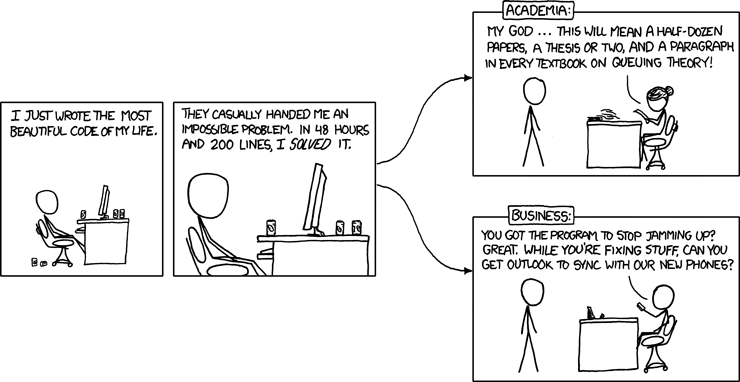This course will emphasize both theory and practice.
Algorithms studied through lecture and reading will be
implemented in a high-level language. Experimental results
will be compared with predicted theoretical results.
Programming assignments will be carried out in a prescribed
high-level language. Minimal instruction in the use of
this language will be provided, you will be expected to
achieve sufficient competence on your own.
The course will include regular homework and programming
assignments (please see my
comments on collaboration and
programming). Assignments are
due before 11:59pm on the due date; there will be
NO CREDIT given for late assignments (without
an excused absence) - turn in as much as you can.
Reading assignments should be completed
before the lecture covering the material.
Not all reading material will be covered in the lectures,
but you will be responsible for the material on homework
and exams.
Quizzes over the assigned reading
may be given at any time.
The Vision Statement of the Computer Science and Information Systems
majors states that our students are distinctive by:
"Bringing a Christ-centered worldview to our increasingly technological
world."
As one step towards the fulfillment of this objective, each
semester, we will identify an influential Christian writing to be read
and reflected upon by students in our classes throughout the term.
This will be treated as an official component of every course and will
be uniquely integrated and assessed at our discretion, generally
as a component of the quiz grade.
See the semester's reading schedule.
In addition, regular meetings will be scheduled throughout the semester
that can be attended for Chapel credit.
It is my hope that students will not view this as one more task to
complete, but as a catalyst for continued discussion ultimately leading
to a deeper walk with Christ.
The chief end of man is to glorify God, and enjoy Him
forever.
(Westminster Confession)
If you have specific physical, psychiatric, or learning disabilities and
require accommodations, please contact the Disability Services Office as
early as possible so that your learning needs may be appropriately met.
You will need to provide current documentation of your disability to the
Disability Services Office. For more information, go to
ds.georgefox.edu
or contact Rick Muthiah, Dean
of the Center for Teaching and Learning (ext. 2314)

